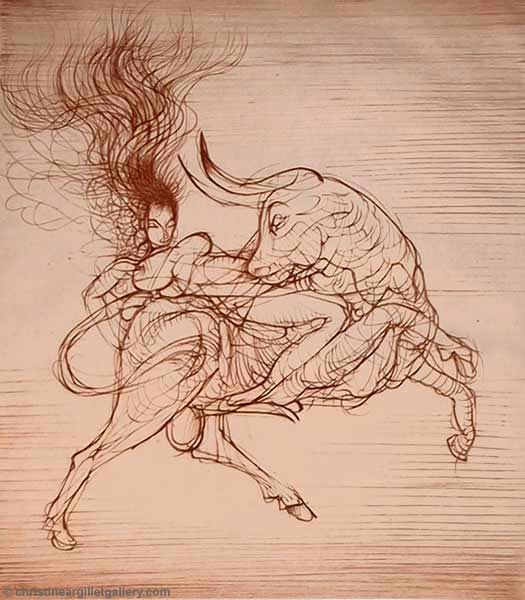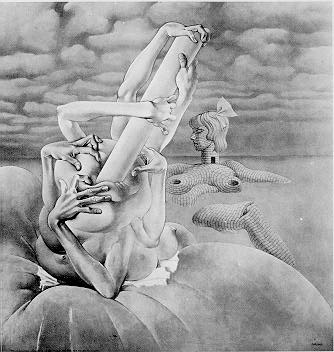|
September 26, 2004
I have been struggling with Klossowski. I accept that the identity of the self depends on the history of the constantly modified body, which has a certain functional cohesion. That is better than locating the self in consciousness.
What I have difficulty with is the confrontation between this understanding the body and the social person who is the thinking Nietzsche. What we have here is the body liberating itself step by step from its own agent (the individuated subject that bestows unity on the chaos of the bodily impulses.) It is as if there is a civil war going on within Nietzsche, which leads to Nietzsche re-creating himself as another kind of being.
But I'm not sure.
Do the violent impluses within our biological body break down both our social identity as individuals, and our understanding of ourselves as agents in the world? How can we understand this?
Here are two suggestions:

Hans Bellmer, The Rape of Europe, copper etching 1967.
The body is a chaos of impulses of sexual desire, and it satisfies these desires by tossing away conventions and morality.
The other suggestion is that what Klossowski is doing with his interpretation of Nietzsche in his Nietzsche and the Vicious Circle can be filled out by bringing in Deleuze and Guattari's 1990's text, What is Philosophy.
That text is concerned with lines of flight or openings that allow thinking to escape from those institutional and cultural constraints that seek to define and enclose it. This points to philosophy as a kind of conceptual creation.
That means a line of flight away for the recieved philosophical tradition --the French Hegel for Deleuze and Australian materialism for us in Australia. That has to be done if philosophy is to be "the art of forming, inventing and fabricating concepts."
In What is Philosophy? Deleuze and Guattari go on to say that:
"More rigorously, philosophy is the discipline that involves creating concepts . .... Concepts are not waiting for us ready-made, like heavenly bodies. There is no heaven for concepts. They must be invented, fabricated, or rather created and would be nothing without their creator's signature. Nietzsche laid down the task of philosophy when he wrote, "[Philosophy] must no longer accept concepts as a gift, not merely purify and polish them, but first make and create them, present them and make them convincing. Hitherto one has generally trusted one's concepts as if they were a beautiful dowry from some sort of wonderland", but trust must be replaced by distrust, and philosophers must distrust most those concepts they did not create themselves."
What this Nietzschean line of thinking means is that we will nothing through concepts unless we have first created them. Hence the emphasis is on making something.
Let us grant this conception of philosophy. We then come back to the body as chaotic and conflicting impulses or desires:

Hans Bellmer
With Bellmer we have entered a world in which sexual desire is aroused by little girls at play. Since the obsessional sexual desire for young girls is taboo, so we have a chaos of conflicting impulses in the body.
Bellmer's work represents, or gives expression, to these obsessional desires. Presumably Nietzsche does something similar with philosophy. He creates concepts from the impulses of pain and suffering in his body.
Are we getting somewhere?
|
